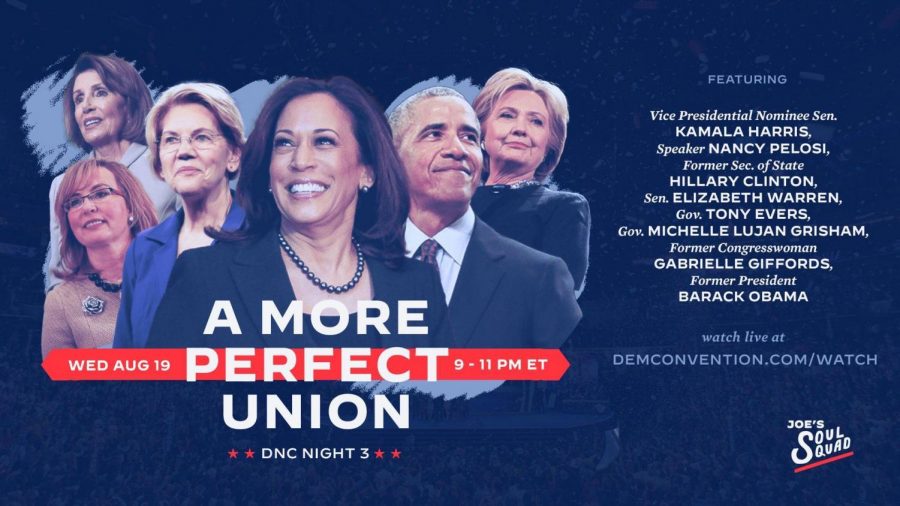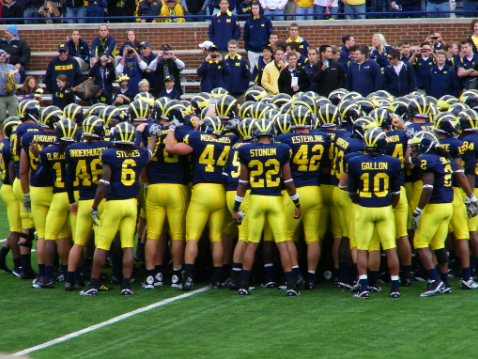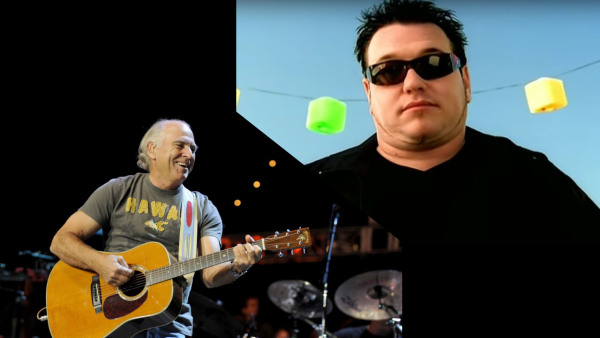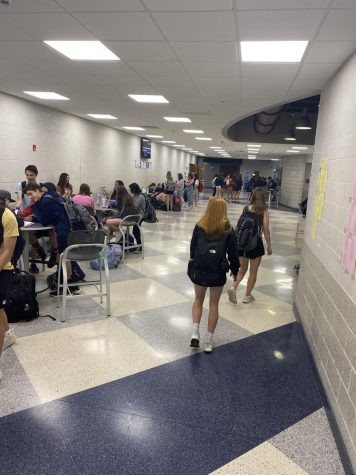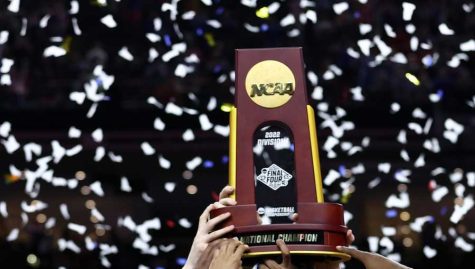Democratic National Convention, Night 3: All-Stars Flex Policy Chops
Promotional graphic for the third night of the Democratic National Convention, featuring a lineup of party heavyweights—nearly all female, for the 100th anniversary of the ratification of the 19th amendment—who focused on Biden’s policy plans and Democrats’ vision for America. Graphic credits: Joe’s Soul Squad.
The third night of the Democratic National Convention featured the closest thing to a party all-star lineup, with some of the biggest names in the party gathering together to deliver a series of speeches in support of the Democratic nominee for President of the United States, Joe Biden. In what could arguably be described as the climax of the convention, party heavyweights like Hillary Clinton, Nancy Pelosi, Elizabeth Warren, Barack Obama, and Kamala Harris laid out the case for Biden’s platform and the need to win against incumbent President Donald Trump in the general election scheduled for this November.
While Night 1 focused extensively on Trump’s track record, and Night 2 took a softer approach emphasizing Biden’s personal moral decency, Night 3 went in a sharply different direction, choosing instead to paint a policy vision of what the future would be like under the Democrats. From gun violence to the climate crisis to immigration to women’s rights, the party offered a clear and compelling vision for an America under Biden, with an emphasis on America’s unity in diversity. The Democrats also spent a sizable portion of the night focusing on the economy, a topic they had previously shied away from, and describing Biden’s plans for rebuilding the country after the COVID-19 pandemic and ensuing recession.
Gun Violence
The night began with the Democrats focusing on the issue of gun violence, a key wedge issue that had been the center of national discourse for months before the pandemic nudged it offstage. While the Democratic national primary had featured several lively moments of sparring over gun policy, the shutdowns necessitated by the pandemic resulted in a noticeable drop in gun violence; rather morbidly, March 2020 was the first March without a school shooting in the United States in two decades. As a result, gun violence has largely fallen by the wayside in the past few months as an election issue, but the Democrats have once more scooped up the standard moving forward.
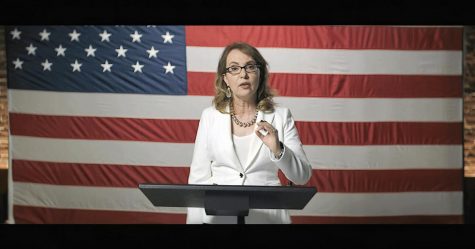
Following an infomercial-style film montage of gun rights activists protesting and interviews with relatives of victims, the first star of the evening appeared onstage: former Congresswoman Gabby Giffords (D-AZ). In 2011, while meeting with constituents in her hometown of Tucson, Arizona, Giffords had been shot in the head at point-blank range; while she survived the assassination attempt, the attack left her with a severe brain injury that limited her mobility and speech. She appeared in the House of Representatives months later to a standing ovation, but ultimately resigned from Congress to continue her rehabilitation and advocate for gun control.
Over a montage of her playing “My Country, Tis of Thee” on the French horn, Giffords gave a brief, but deeply passionate speech in support of Biden. Still struggling at times with the words, but showing marked improvement from years ago, Giffords said, “I’ve known the darkest of days, days of pain and uncertain recovery. But confronted by despair, I’ve summoned hope; confronted by paralysis and aphasia, I responded with grit and determination. I put one foot in front of the other, I found one word and then I found another.”
Giffords continued, “My recovery is a daily fight, but fighting makes me stronger. Words once came easily. Today, I struggled to speak, but I have not lost my voice. America needs all of us to speak out, even when you have to fight to find the words.” Giffords had reportedly worked for months with her speech therapist in order to deliver the remarks, ever since she endorsed Biden in March. She concluded with another appeal to Biden’s campaign, asserting, “We must elect Joe Biden. He was there for me, he’ll be there for you too…Vote, vote, vote!”
Climate and Immigration
Following Giffords’ moving speech about gun violence, the topic transitioned to two more issues which were also once hot-topic questions but have likewise been shunted to the side after the pandemic: the climate crisis, and immigration. While the issue of climate change has mostly been uniform along partisan lines, with nearly all Democrats supporting environmental protections and Republicans opposing them, immigration has been a more contentious intraparty issue; a notable divide appeared early in the Democratic primary when Biden sparred repeatedly with younger Democrats like Julian Castro over decriminalizing the border.
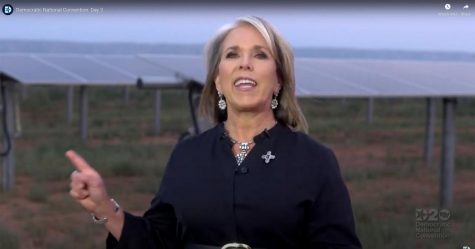
Nonetheless, the Democrats presented a united front during the convention, with cinematographic videos playing about the consequences of climate change and moving interviews with immigrants and their relatives. New Mexico Governor Michelle Lujan Grisham delivered a spirited address laying out the future of environmental policy under the Democrats. Standing in front of a field of solar panels in Albuquerque, Grisham described her pride for New Mexico “punching above our weight”, not only in the COVID-19 pandemic but also in addressing climate change.
Grisham continued by describing her state’s “climate leadership”, expanding environmental protections and holding polluters like oil and gas industries accountable. She declared that “We’re laying a roadmap here for what America can and should look like in the 21st century”, and then transitioned to praising Biden’s climate plan, such as rejoining the international climate agreement and investing in clean energy jobs. She concluded with a barbed shot at the president, commenting, ““This November, we have the chance to end two existential crises: the Trump presidency and the environmental annihilation he represents.”
Following the debut performance of Billie Eilish’s new song “My Future”, an admittedly questionable attempt to win over young voters, the topic transitioned to immigration. Aided by the new virtual format, the convention featured moving testimonials from immigrants, both legal and illegal, who decried the Trump administration’s policy of child separation; in one memorable clip, the 11-year-old daughter of a Marine who voted for Trump and had her mother deported blasted Trump by saying, “Instead of protecting us, you tore our world apart…My mom is a good person, and she’s not a criminal.”
Women’s Rights
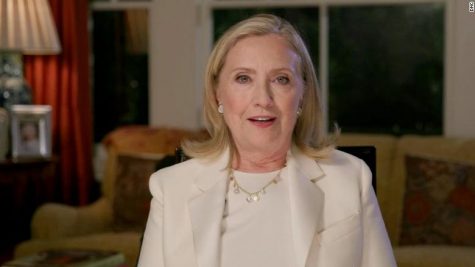
Tuesday marked the 100th anniversary of the ratification of the 19th Amendment, which formally granted women the right to vote, and the third night of the Democratic National Convention took on a distinctly feminist theme. Nearly all of the speakers, save former President Barack Obama, were female politicians, demonstrating the recent ascendancy of women in American politics, particularly the Democratic Party; in 1990, there were only 2 women in the Senate, but that number has now ballooned to 26, 17 of which were Democrats.
Former Secretary of State Hillary Clinton, the party’s 2016 nominee, now took the stage. It was doubtless a very difficult speech to deliver—four years ago, Clinton had been the one accepting the nomination—but she nonetheless kept her tone light despite the seriousness of her message. She began by reflecting that “the morning after the last election I said we owe Donald Trump and open mind and the chance to lead, I meant it. Every president deserves that.” However, quickly she transitioned to decrying his record on the pandemic, lamenting, “I wish Donald Trump knew how to be a president because America needs a president right now.”
Clinton turned to discussing her 2016 loss, which clearly still haunts her: “Look, this can’t be another would have, could have, should have election,” she said, urgency creeping into her voice. “As Michelle Obama and Bernie Sanders warned us if Trump is reelected things will get even worse….Remember back in 2016 when Trump asked, ‘What do you have to lose?”’ Well, now we know. Our healthcare, our jobs, our loved ones, our leadership in the world and even our post office.” She concluded with a chilling warning to Democrats, acknowledging her loss in the electoral college: “Don’t forget, Joe and Kamala can win by 3 million votes and still lose, take it from me. So we need numbers overwhelming so Trump can’t sneak or steal his way to victory.”
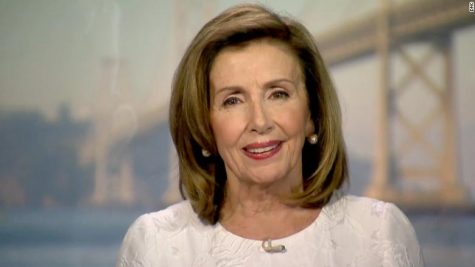
Clinton was succeeded by Speaker of the House Nancy Pelosi (D-CA), who continued off the theme of ensuring an overwhelming margin of victory over Trump. Beginning by boasting of Democrats having “most diverse majority in history, more than 60% women, people of color, and LGBTQ”, she described the various bills the House has passed, from lowering healthcare costs to protecting voting rights. These bills, however, have yet to be passed in the Senate, having been sent off to die in committee or simply being held up in procedure, prompting Pelosi to blast Senate Majority Leader Mitch McConnell (R-KY) and President Trump, repeating three times: “Who is standing in the way? Mitch McConnell and Donald Trump.”
Pelosi continued by asserting that “we are unleashing the power of women to take our rightful place in our national life by championing a woman’s right to choose and defending Roe v. Wade, securing safe and affordable childcare, preserving social security and passing equal pay for equal work.” To women affected by the Trump administration’s attack on access to abortions, she urged them vote for Biden, “whose heart is full of love for America and rid the country of Trump’s heartless disregard for America’s goodness.”
The Economy
As the convention entered its second half, the topic turned to arguably the most important factor in presidential elections: the economy. Historically, incumbent presidents have been judged nearly entirely based on the performance of the economy; in a weak economy, such as Carter in 1980 or H.W. Bush in 1992, incumbents have been defeated by wide margins, whereas incumbents in a strong economy, such as Reagan in 1984 or Clinton in 1996, have typically cruised to re-election. With the COVID-19 pandemic having plunged the United States into recession, the Democrats have sought to reassert their economic policy as an alternative to Trump, whose branding as a self-made billionaire businessman has thus far given him the edge in voters’ perception of which party is better equipped to handle the economy.
Democrats focused in particular on Biden’s guarantees to small businesses and ordinary blue-collar workers, with former Secretary of Labor Hilda Solis asserting that while Obama and Biden had rescued the country from the 2008 recession, “because of Donald Trump’s failures, we must once again rescue a sinking economy. Millions of Americans are out of work and communities of color are the hardest hit. Millions of essential workers are putting their lives at risk with little protections and millions more are just plain tired.” In juxtaposition, Solis touted Biden’s plan to create 5 million union jobs through “bringing back supply chains to America…[and] investing in clean energy”, promising that “When it comes to expanding the economy for all people, no one, no one is going to be a stronger voice than our next president, Joe Biden.”
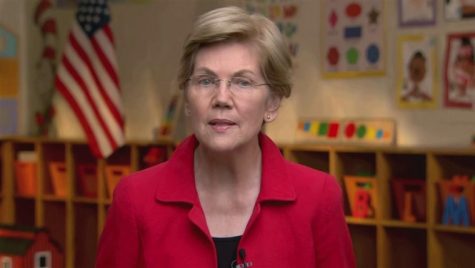
Solis was followed by Senator Elizabeth Warren (D-MA), another one of Biden’s 2020 rivals for the presidential nomination, who continued arguing for the benefits that Biden’s plans would bring to the table. Speaking from a shuttered childcare center, with the letters “BLM” subtly spelled out behind her on the shelves, Warren gushed “I love a good plan, and Joe Biden has some really good plans,” from bringing back manufacturing jobs, creating new clean energy jobs, increasing social security benefits, canceling student loan debt, and enforcing bankruptcy laws. Many of these plans had been Warren’s own in the primary, and adopted by Biden following her exit in March; while they had frequently sparred with each other as part of the larger progressive-moderate divide, Biden’s platform has clearly attempted to straddle the gap.
In particular, she zeroed in on the issue of childcare, commenting that “Childcare was already hard to find before the pandemic and now parents are stuck. No idea when schools can safely reopen and even fewer childcare options.” She delved into her personal backstory, talking about how she felt overwhelmed as a young teacher when she had to simultaneously manage her children and her career, and how her “Aunt Bee” came to the rescue. She acknowledged that “I get to be here tonight because of my Aunt Bee…[but] if you have a baby and don’t have an Aunt Bee, you’re on your own.” She continued by arguing that “It’s time to recognize that childcare is part of the basic infrastructure of this nation.”
Warren concluded by shifting the narrative to criticism of Trump’s record, asserting, “Donald Trump’s ignorance and incompetence have always been a danger to our country. COVID-19 was Trump’s biggest test. He failed miserably…This crisis is on Donald Trump and the Republicans who enable him.” Her peroration referenced her famous slogan, “Nevertheless, she persisted”, stemming from when Mitch McConnell silenced her on the Senate floor during Attorney General Jeff Sessions’s hearing: “We stay in this fight so that when our children and our grandchildren ask what we did during this dark chapter in our nation’s history, we will be able to look them squarely in the eye and say, ‘we organized, we persisted and we changed America’.”
Finale: Passing of the Torch
The night concluded with two powerful speeches from former President Barack Obama and Biden’s now-official Vice Presidential nominee, Senator Kamala Harris (D-CA). While originally Obama had been slated for the finale, he had offered to exchange spots with Harris, in a symbolic “passing of the torch”. The purposeful pairing highlighted the similarities between the two of them: both had been freshman senators when running for president for the first time, Obama in 2008 and Harris in 2020; both had been trailblazers in their careers, with Harris even having been characterized as the “female Obama” early on in her presidential bid.
In an unprecedented denunciation of the sitting president from his predecessor, Obama strenuously argued for the need to elect Joe Biden and oust Donald Trump. Beginning by asserting that “what we do these next 76 days, will echo through generations to come,” Obama started in his trademark unflappable voice, recounting the history of the constitution as an imperfect document which was gradually improved “through civil war and bitter struggles…to include the voices of those who’d once been left out”, before gradually crescendoing to a forceful condemnation of his successor.
Obama continued, “I have sat in The Oval Office with both of the men who are running for president.” He acknowledged that he “never expected that my successor would embrace my vision or continue my policies,” but expressed bitter disappointment that Donald Trump did not live up to his hopes of “[showing] some interest in taking the job seriously, that he might come to feel the weight of the office and discover some reverence for the democracy that had been placed in his care.” In an incisive cut at the president’s record, he said, “Donald Trump hasn’t grown into the job because he can’t…the consequences of that failure are severe.”
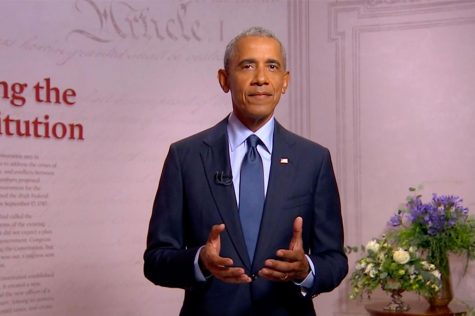
This was a clear parallel to his wife Michelle’s speech during Night 1, when she similarly asserted “Donald Trump is the wrong president for our country; he has had more than enough time to prove otherwise”. Nonetheless, while the two Obamas wove similar themes in their addresses, they took distinct approaches to their delivery: while Michelle tried to create intimate emotional connections with her viewers, Barack retained his distinctly cerebral touch, restraining his emotions as much as possible and stressing the facts—“170,000 Americans dead, millions of jobs gone,” he said, the frustration audible in his measured voice.
Obama then turned to praising the Democratic ticket. Obama and Biden had famously shared a close relationship, culminating with his awarding of the Presidential Medal of Freedom with Distinction to Biden in 2017. In his speech, Obama described Biden as not only a friend, but rather “a brother”, who maintained fundamental principles of empathy and decency despite “too much grief”. As for Harris, Obama praised her as “Someone who knows what it’s like to overcome barriers and who’s made a career fighting to help others live out their own American dream”, and asserted that she and Biden “actually care about every American and that they care deeply about this democracy.”
However, Obama nonetheless returned time and time again to hammer Trump for his record, from using his office to enrich himself, to deploying the military against peaceful protestors on American soil, to viewing the free press as the enemy. As his speech reached a climax, Obama grew visibly emotional, channeling an uncommon tone of righteous anger as he asserted, “none of this should be controversial. These shouldn’t be Republican principles or Democratic principles, they are American principles. But at this moment, this president and those who enable him have shown they don’t believe in these things.”
As he neared the end of his speech, Obama once again returned to a more levelheaded tone, turning back to the theme of generational change in American politics. He directly addressed America’s youth, calling them “this country’s dreams fulfilled. Earlier generations had to be persuaded that everyone has equal worth. For you, it’s a given.” He asserted that “your system of self government can be harnessed to help you realize those convictions for all of us. You can give our democracy new meaning. You can take it to a better place. You’re the missing ingredient, the ones who will decide whether or not America becomes the country that fully lives up to its creed.”
The convention then closed with its final star of the night, the newly minted vice presidential nominee: Senator Kamala Harris. Biden had announced his pick last Tuesday, August 11, ending months of speculation over who would ultimately be selected. Many of Harris’s rivals for the vice-presidential slot also had speaking roles at the convention, from Elizabeth Warren on Night 3 to Gretchen Whitmer on Night 1 to Tammy Duckworth (who will be speaking on Night 4). In the end, Harris was deemed to be the right choice for a multitude of reasons—particularly her experience and ability to step into office on day 1 if necessary, and her identity as a black and Asian woman in a time of national reckoning regarding racial justice.
In her speech, Harris clearly relished the chance to reintroduce herself to the American public, focusing more explicitly on her personal story than she had before. She began by describing herself as standing on the shoulders of countless women before her: “Mary Church Terrell, Mary McLeod Bethune, Fannie Lou Hamer, and Diane Nash, Constance Baker Motley, and the great Shirley Chisholm,” before acknowledging that “there’s another woman whose name isn’t known, whose story isn’t shared. Another woman whose shoulders I stand on, and that’s my mother Shyamala Gopalan Harris.”
Harris then went into depth about how her mother, an Indian immigrant studying at UC Berkeley, raised her as both an Indian-American and an African-American girl. After her Jamaican-born father left when Kamala was 5, her mother “made it look easy though it never was…She raised us to be proud strong black women, and she raised us to know and be proud of our Indian heritage.” This was a side of Kamala that she rarely shared with the public before, having always emphasized her African-American heritage over her Indian-American heritage, but on Night 3 the latter was in full force: “Family is my uncles, my aunts, and my chittis,” she continued, referring to a traditional Tamil term of endearment for her mother’s sisters.
She also emphasized her prosecutorial background, though this had been a returning narrative in her presidential bid: “I have fought for children and survivors of sexual assault, I fought against transnational criminal organizations. I took on the biggest banks and help take down one of the biggest for-profit colleges,” she said proudly, before saying, “I know a predator when I see one.” She didn’t mention President Trump’s name, but the meaning couldn’t have been plainer as she proceeded to directly blast his record: “Donald Trump’s failure of leadership has cost lives and livelihoods. If you’re a parent struggling with your child’s remote learning, or you’re a teacher struggling on the other side of that screen, you know what we’re doing right now is not working.”
In particular, she focused on how the virus has exposed the “structural racism” of American healthcare, declaring “This virus, it has no eyes, and yet it knows exactly how we see each other and how we treat each other.” In what quickly became the most memorable quote of the night, she declared that “there is no vaccine for racism” and committed to solving those inequities, beginning with police brutality. “None of us are free until all of us are free,” she declared solemnly, in a noticeable departure from her otherwise beaming smile.
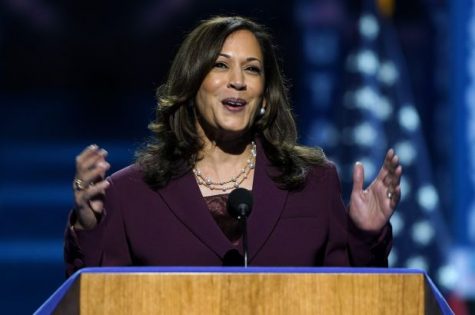
She then spoke of her personal connection with Biden, in particular focusing on her friendship with his late son Beau Biden, who served as Attorney General of Delaware while Harris was serving as Attorney General of California. She described how “during the great recession, he and I spoke on the phone nearly every day, working together to win back billions of dollars for homeowners from the big banks that foreclosed on people’s homes” but also the more personal moments, as Beau disclosed how his father commuted back and forth from Washington every morning and night so his sons “got to have breakfast every morning with their dad [and]…went to sleep every night with the sound of his voice reading bedtime stories.”
Harris then stressed Biden’s long record of standing up for people, from authoring the Violence Against Women Act, to the Assault Weapons Ban of 1994, to the Recovery Act and Affordable Care Act while serving as Obama’s Vice President, and characterized him as a “president who turns our challenges into purpose. Joe will bring us together to build an economy that doesn’t leave anyone behind, where a good paying job is the floor, not the ceiling… to end this pandemic and make sure that we are prepared for the next one…[and] to squarely face and dismantle racial injustice, furthering the work of generations.”
Concluding by once more embracing her image as a “happy warrior” on the campaign trail, Harris described the challenges of the election and beyond as “what an awesome responsibility, what an awesome privilege.” She finished with a sentimental touch, “years from now, this moment will have passed and our children, and our grandchildren will look in our eyes and they’re going to ask us, ” Where were you when the stakes were so high?” They will ask us, “What was it like?” And we will tell them, we will tell them not just how we felt, we will tell them what we did.” As the socially distanced convention broke into claps, Biden joined her on stage and the two waved farewell.
Night 3 of the Democratic National Convention featured a much more heavily policy-based series of speeches emphasizing the Democrats’ vision for America from gun control to women’s rights to the economy, deliberately contrasting with President Trump’s past agenda. The nearly all-woman lineup, 100 years to the week after the ratification of the 19th Amendment granting women the right to vote, was an effective way of reminding Americans not only of how far we have come as a country, but also of the potential history that could be made in the next few months.

Vincent Jiang is currently a senior at West Morris Central High School and President of Journalism Club. Passionate about global affairs, he enjoys writing...

